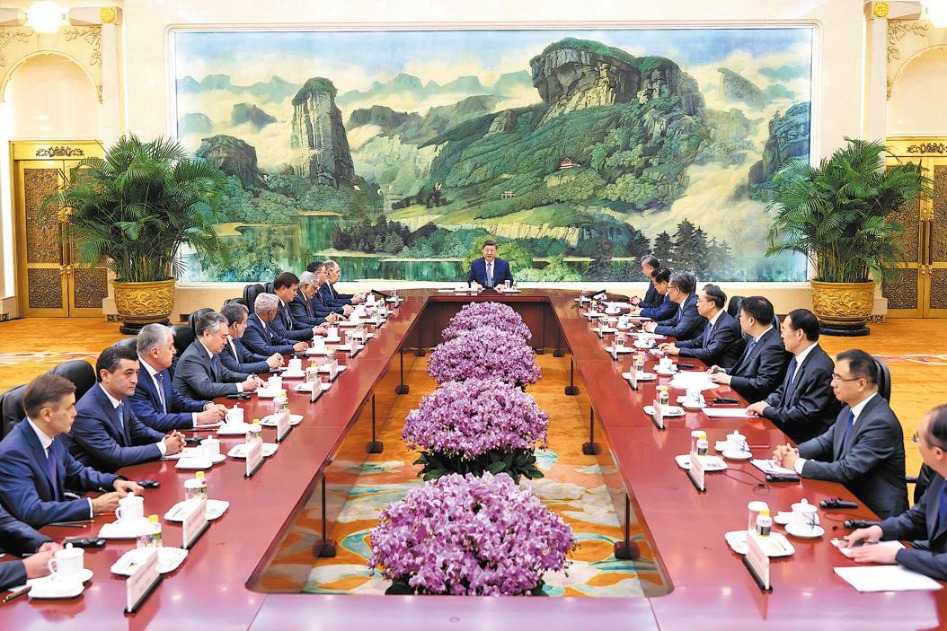Undertake the Global Development Initiative data mission to advance the 2030 Agenda for Sustainable Development


In September 2021, Chinese President Xi Jinping proposed the Global Development Initiative (GDI) at the 76th session of the United Nations General Assembly to strengthen global cooperation to accelerate the implementation of the 2030 Agenda for Sustainable Development and promote stronger, greener and healthier development. In June 2022, at the High-level Dialogue on Global Development, President Xi Jinping emphasized the need to "…step up data cooperation and sharing to improve monitoring and evaluation of sustainable development goals (SDGs) and to promote a more science-driven implementation of the 2030 Agenda for Sustainable Development". The Chair's Statement at the High-level Dialogue on Global Development highlighted a list of deliverables, including No.28: "Launching a Sustainable Development Satellite Constellation Plan, as well as developing and sharing data and information for Sustainable Development Goals monitoring."
Technological innovation has been playing an indispensable role in creating new opportunities for sustainable development. Digital technology is becoming an important driver for global sustainable development. Data, as a core element in digital technology, requires concerted efforts to improve data cooperation and sharing to unlock unique opportunities for the implementation of SDGs. Using the concept of "governance of data", digital and other frontier technologies have the potential to help implement the 2030 Agenda for Sustainable Development by solving the problem of lacking information and tools.
President Xi Jinping announced at the 75th session of the UN General Assembly that China will set up an International Research Center of Big Data for Sustainable Development Goals (CBAs). At the inauguration, President Xi sent a congratulatory letter with the message that "The sci-tech innovation and application of big data will help the international community to overcome difficulties and implement the 2030 Agenda for Sustainable Development globally". UN Secretary-General António Guterres noted in his congratulatory speech to the inauguration of CBAS that "Big data is a powerful tool... This Research Centre will work side-by-side with the Regional Hub for Big Data to support the United Nations Global Platform". The vision of the CBAS is to promote the realization of the 2030 Agenda with scientific and technological innovation and big data. Under the framework of GDI the following progress has been made:
1. Developing the world's first SDG Big Data Platform.
The platform provides access to over 200 spatial information analysis tools, decision support processes, simulation prediction models and visualization algorithms, serving a total of 174 countries and regions worldwide, with a total of over 100 million visits and over 1.34 million data downloads. It has been included in the United Nations 2030 Connect Platform.
2. Developing and launching the world's first Sustainable Development Science Satellite 1 (SDGSAT-1).
The Chinese government announced in September last year that SDGSAT-1 data would be open to the world. At present, the SDGSAT Open Science Program has provided access to data users in 70 countries.
3. Developing and sharing SDG data products.
In addition to the 6 sets of SDG data products donated by the Chinese government to the United Nations last year, this year the CBAS have also shared 7 sets of global water resource data products with the United Nations. This data provided support for countries to better achieve SDGs in food security, terrestrial ecological protection, climate change, urbanization and other fields.
4. Releasing serious report on Big Data in support of SDGs.
The reports present successful research, monitoring and evaluation results of Big Earth Data on SDGs at global, regional, national and local scales, presenting new data products, methods, model and decision support processes. The yearly-published series of "Big Earth Data in Support of the Sustainable Development Goals" presented a total of 106 case studies introducing 84 sets of SDG data products, 54 methods and models, and 75 decision support suggestions in four years.
The CBAS has carried out extensive and in-depth cooperation with UNEP, UNDESA, UNCCD and UN-Habitat on the study of SDGs. Over the past year, the CBAS has signed memorandums of cooperation with IUCN, ICCROM and ICOMOS. Bruno Oberle, Director General of IUCN, stated that cooperation will significantly enhance and strengthen IUCN's capabilities in this field and enhance China's global leadership in world heritage protection. ICCROM Director-General Webber Ndoro noted that ICCROM will establish a very strong partnership with China through this signing. ICOMOS President Teresa Patricio believes that cooperation between the two parties will help conduct a more comprehensive assessment of the impact of cultural heritage and its environment.
This year, the CBAS has been invited to participate in the United Nations 2023 Water Conference; the United Nations World Data Forum 2023; and the 8th Multi-stakeholder Forum on Science, Technology and Innovation for the Sustainable Development Goals; and has organized a series of side events on "Big data for SDGs". After visiting the CBAS in February this year, Csaba K?r?si, President of the 77th session of the United Nations General Assembly, said "I had a meeting with one of the institutions of the Chinese Academy of Sciences, CBAS, and I saw the future. I saw something that I was dreaming of when we crafted the SDGs. Now I see how big data can be implemented, can result in complex integrated solutions, and can serve communities across the world. … I'm hopeful that those scientists…can come to New York and will share their knowledge and experience with the Member Countries". He remarked on how the research being done by the Chinese Academy of Sciences to support implementation of the SDGs is a "model" for other countries of the world.
Much can be done to fulfill the GDI's mission in data. We should follow the principle of promoting "data sharing, common use and mutual benefit", forge synergy with the strategic framework of "Digital Cooperation Road map" and "Global Digital Compact" promoted by the United Nations Secretary-General António Guterres, strengthen the construction of big data infrastructure, and provide comprehensive services for sustainable development of big data.
Efforts should be made in the dynamic assessment of global progress in sustainable development and sharing of cutting-edge methods and successful practices to implement the sustainable development scientific Satellite constellation plan, and to build a global SDGs collaborative observation network. Digital technology has tremendous potential to benefit people of all countries, and it can make unique contributions to implementing the GDI and promoting the comprehensive and in-depth implementation of the 2030 Agenda for Sustainable Development.
Guo Huadong is a professor of the Chinese Academy of Sciences, Director-General of International Research Center of Big Data for Sustainable Development Goals and was a member of UN Secretary General's 10-Member Group of SDGs (2018-2021).
The opinions expressed here are those of the writer and do not necessarily represent the views of China Daily and China Daily website.
If you have a specific expertise, or would like to share your thought about our stories, then send us your writings at opinion@chinadaily.com.cn, and comment@chinadaily.com.cn.


































